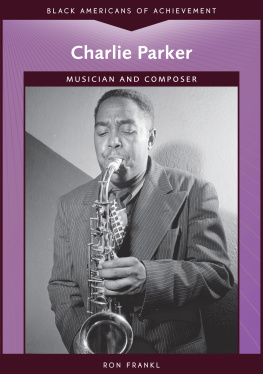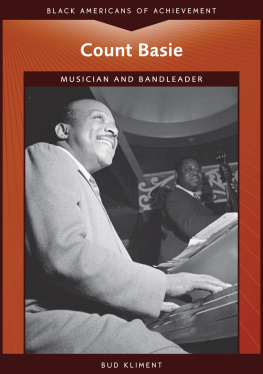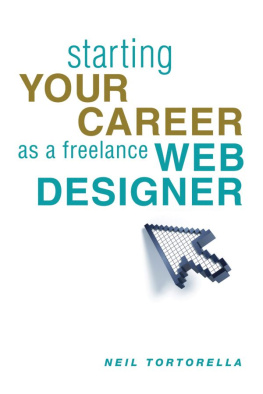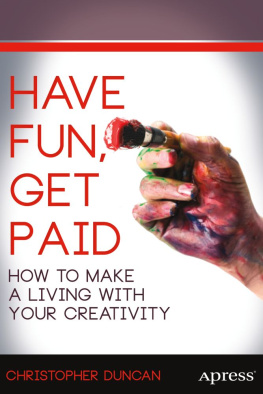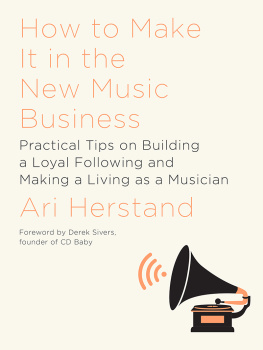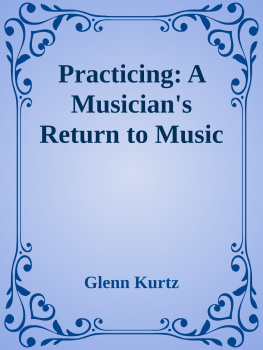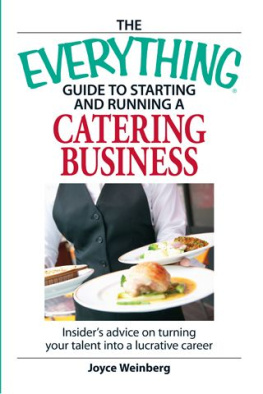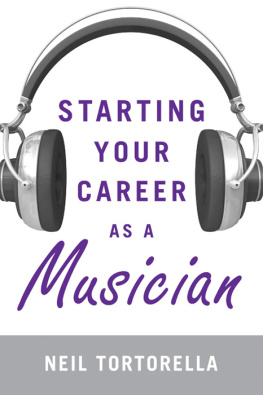Tortorella - Starting Your Career as a Musician
Here you can read online Tortorella - Starting Your Career as a Musician full text of the book (entire story) in english for free. Download pdf and epub, get meaning, cover and reviews about this ebook. City: New York;NY, year: 2013;2012, publisher: Skyhorse Publishing;Allworth Press, genre: Home and family. Description of the work, (preface) as well as reviews are available. Best literature library LitArk.com created for fans of good reading and offers a wide selection of genres:
Romance novel
Science fiction
Adventure
Detective
Science
History
Home and family
Prose
Art
Politics
Computer
Non-fiction
Religion
Business
Children
Humor
Choose a favorite category and find really read worthwhile books. Enjoy immersion in the world of imagination, feel the emotions of the characters or learn something new for yourself, make an fascinating discovery.
- Book:Starting Your Career as a Musician
- Author:
- Publisher:Skyhorse Publishing;Allworth Press
- Genre:
- Year:2013;2012
- City:New York;NY
- Rating:4 / 5
- Favourites:Add to favourites
- Your mark:
- 80
- 1
- 2
- 3
- 4
- 5
Starting Your Career as a Musician: summary, description and annotation
We offer to read an annotation, description, summary or preface (depends on what the author of the book "Starting Your Career as a Musician" wrote himself). If you haven't found the necessary information about the book — write in the comments, we will try to find it.
Starting Your Career as a Musician — read online for free the complete book (whole text) full work
Below is the text of the book, divided by pages. System saving the place of the last page read, allows you to conveniently read the book "Starting Your Career as a Musician" online for free, without having to search again every time where you left off. Put a bookmark, and you can go to the page where you finished reading at any time.
Font size:
Interval:
Bookmark:
CAREER as a
NEIL TORTORELLA

Copyright 2013 by Neil Tortorella
All rights reserved. Copyright under Berne Copyright Convention, Universal Copyright Convention, and Pan American Copyright Convention. No part of this book may be reproduced, stored in a retrieval system, or transmitted in any form, or by any means, electronic, mechanical, photocopying, recording or otherwise, without the express written consent of the publisher, except in the case of brief excerpts in critical reviews or articles. All inquiries should be addressed to Allworth Press, 307 West 36th Street, 11th Floor, New York, NY 10018.
Allworth Press books may be purchased in bulk at special discounts for sales promotion, corporate gifts, fund-raising, or educational purposes. Special editions can also be created to specifications.
For details, contact the Special Sales Department, Allworth Press, 307 West 36th Street, 11th Floor, New York, NY 10018 or info@skyhorsepublishing.com.
15 14 13 12 11 5 4 3 2 1
Published by Allworth Press,
an imprint of Skyhorse Publishing, Inc.
307 West 36th Street, 11th Floor, New York, NY 10018.
Allworth Press is a registered trademark of Skyhorse Publishing, Inc., a Delaware corporation.
www.allworth.com
Cover design by Mary Belibasakis
Library of Congress Cataloging-in-Publication Data is available on file.
ISBN: 978-1-58115-928-8
Printed in the United States of America
These pages are dedicated to my son, Alex, who is the light of my life, one of the best guitar players I know, and a brilliant all-around musician. They are also dedicated to my early band mates, Jonathan Sam Wuhrer, Carmine Pinto, Tom Brigante, and Phil Perne. These guys are some of the best musicians I know, and they taught me so much along our wildly weird way. And, of course, to all my readers and struggling musicians: My hope is that the words within aid you on your musical journey.
M usic: Its a powerful thing. Music paints a sonic picture that can make us laugh or cry. A song can bring back the memory of a moment in time or transport us to another place. Voltaire is credited with saying, With great power comes great responsibility. And so it is for the musician.
When musicians wield their instruments, they have a responsibility to their audience. That audience might be a sold-out stadium crowd or simply the musician sitting alone, playing to express whats in his or her heart. Either way, its an emotional experienceat least it should be. There are expressive musicians, and there are mechanics. Mechanics may know the notes and tempo, but theres no feeling or emotion in their efforts.
A musicians instrument should be an extension of himself or herself. Where the instrument ends and the artist begins should be transparent. Great players are ones who know their instruments so well, they dont need to think about the instruments. The passion within is automatically passed through to the instrument.
Music is a universal language. Its hardwired within us. A song played in Kansas or Outer Mongolia will usually evoke the same emotional response. Theres a load of research thats been done on the psychological effects of music on human emotion. But I believe that when all is said and done, the good or great musician understands this language intuitively. Sure, the mechanical musician can play a song, but without an understanding of the nuances of the language, the song is just a collection of notes and some musical notation on a piece of paper. It will always lack those elusive elements of heart and soul.
With these definitions in place, its time to start talking, or rather writing, about a career in music. At the top of the list is the fact that its not easy. A search on YouTube will quickly demonstrate that theres no shortage of talent out there. If you expect to have a musical career, talent should be a given.
Even if youre the best player on the planet, it doesnt matter much if nobody hears you. That means it is critical to aggressively promote yourself or your band. Right about now, youre likely thinking, But Ill be selling out. Dont sweat it. Youre not. If you truly believe you have something of value to offer an audience, youre doing people a favor by telling them about you and your music. If you dont promote, youll probably find yourself sitting on your sofa playing gut-wrenching songs of love gone wrong to an audience of oneyourselfwhile thinking, Why cant I get any gigs?
Beyond promotion, becoming a successful musician means setting goals; understanding your audience; having some basic business skills; learning and growing as an artist; and, most important, having drive and the right, positive attitude. The good news is that all these things can be learned. It just takes the willingness to learn them and put your knowledge into action.
Unless you happen to be clairvoyant, you dont know what the future holds. Lao Tzu is credited with saying, The journey of one thousand miles begins with a single step. So, youve got to start somewhere. Hopefully this book will help you take that first step and then move forward. Who knows? You might just become the next big sensationor not. You might get a steady stream of weekend club gigs, find a job as the music minister at a church, or teach. It all depends on your goals.
Theres more good news. Well, more of a double-edged sword type of news. There has never been a better time to be a musician, whether youre a solo act or with a band, because of the technology available to artists. On the flip side, theres significantly more competition, all of whom are vying for fame and fortune, the gig at the bar down the street, or that minister of music job that just opened up.
A bit of a history lesson is in order. In 1877, Thomas Edison, while tinkering with a new telegraph gizmo, noticed speech-like noises emanating from the device. He toyed with it a bit more and developed the first phonograph. He recorded Mary Had A Little Lamb by the end of 1877. The song became an instant, chart-topping hit, mostly because it was the only successful recording of a human voice in existence. And so the recording industry was born.
Edisons phonograph evolved into the gramophone, the graphophone, the Victrola, and, eventually, eight-track and cassette tapes followed by compact discs (CDs). Music was now widely available to the population. Plus, it was relatively easy to obtain; all it took was a trip to the record or department store. Some folks opted for the convenience of joining record clubs and received their melodic orders via the Postal Service.
Then came the beginning of the death throes for the record labels. The Grim Reaper came in the form of digital music, the Internet, file sharing, and various other threats to an industry that had become bloated and huge.
The label, also known as the record company, is responsible for producing, promoting, marketing, distributing, and selling an album. The label sinks a load of dough into an artist, betting the audience will love the performer. If the people in the audience do, they buy CDs, tickets to concerts, and various merchandise. In return, the label takes the lions share of the profit.
In the past, an artist or band had little hope of making it big without being discovered by an A&R person working for a label. (A&R stands for artists and repertoire; in some circles, mostly musicians, it stands for attitude and rejection.) A&R people are powerful in the record industry. They scout talent and sign the winners. They also nurture the band, aid in song selection, find the right producer, and act as the liaison between all the various departments within the record company, among other tasks.
Font size:
Interval:
Bookmark:
Similar books «Starting Your Career as a Musician»
Look at similar books to Starting Your Career as a Musician. We have selected literature similar in name and meaning in the hope of providing readers with more options to find new, interesting, not yet read works.
Discussion, reviews of the book Starting Your Career as a Musician and just readers' own opinions. Leave your comments, write what you think about the work, its meaning or the main characters. Specify what exactly you liked and what you didn't like, and why you think so.



